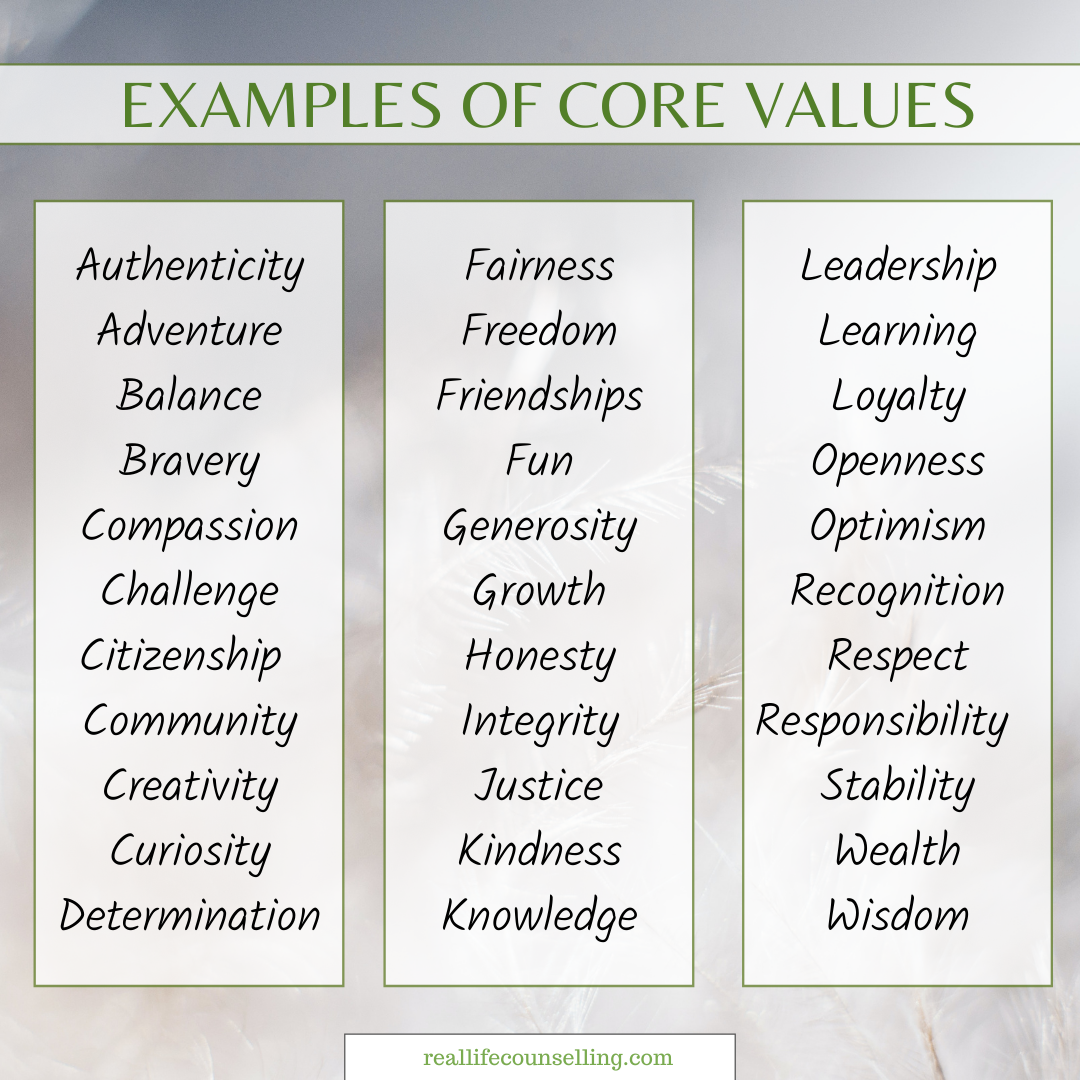Understanding The Good Life: Defining Your Values And Goals

Table of Contents
Identifying Your Core Values
What are Values?
Values are deeply held beliefs that guide our decisions and actions. They represent what's truly important to us, shaping our priorities and influencing the choices we make throughout our lives. Understanding your core values is fundamental to achieving a fulfilling life because they provide a compass for navigating life's complexities. Without a strong sense of values, we risk drifting aimlessly, pursuing goals that ultimately leave us unfulfilled.
- Examples of common values: Family, creativity, freedom, knowledge, health, security, spirituality, adventure, contribution, honesty.
- Values guide decision-making: When faced with choices, consider which option best aligns with your prioritized values. For example, if family is a top value, you might prioritize family time over career advancement opportunities.
- Exercises for identifying personal values:
- Value Ranking: List 20 values, then rank them in order of importance to you.
- Reflection Prompts: Consider moments of great joy and satisfaction. What values were present in those experiences? What kind of person do you aspire to be? What legacy do you want to leave behind?
Aligning your actions with your values fosters a profound sense of purpose and fulfillment. Imagine a doctor who deeply values helping others; their work becomes inherently meaningful, transcending the challenges of a demanding profession. Conversely, pursuing wealth solely for material gain might leave someone feeling empty, even with significant financial success, if it contradicts their deeper values.
Setting Meaningful Goals
SMART Goals for the Good Life
Once you've identified your core values, the next step is to set meaningful goals that align with them. The SMART goal framework provides a useful structure:
-
Specific: Clearly define your goal, leaving no room for ambiguity.
-
Measurable: Establish concrete metrics to track your progress.
-
Achievable: Set realistic goals that challenge you but remain attainable.
-
Relevant: Ensure your goals align with your values and overall life vision.
-
Time-bound: Set deadlines to maintain focus and momentum.
-
Examples of SMART goals:
- Career: "Get promoted to Senior Marketing Manager by December 2024 by completing a professional certification and exceeding quarterly sales targets."
- Relationships: "Spend quality time with my family for at least two hours every Sunday for the next six months."
- Personal Growth: "Read one self-improvement book per month and practice mindfulness meditation for 10 minutes daily for the next year."
Breaking down large, ambitious goals into smaller, manageable steps is crucial for maintaining motivation and preventing overwhelm. Celebrate small victories along the way to reinforce positive habits and stay on track. Goal setting is not just about achievement; it’s a powerful tool for fostering long-term happiness and satisfaction.
Obstacles are inevitable. Procrastination, fear of failure, and unexpected life events can derail even the most well-intentioned plans. Develop strategies to overcome these challenges, such as time management techniques, positive self-talk, and seeking support from friends or mentors.
The Interplay of Values and Goals
Aligning Goals with Values
The crucial link between values and goals is alignment. Pursuing goals that conflict with your values leads to internal conflict, stress, and ultimately, dissatisfaction.
- Misaligned goals lead to unhappiness: Imagine someone who values family but prioritizes a demanding career that leaves them with little time for loved ones. This conflict can lead to resentment and a sense of unfulfillment.
- Evaluating goal alignment: Ask yourself: Does this goal support my core values? Does pursuing this goal compromise any of my values? If the answer is yes to the second question, it's time to re-evaluate your approach.
- Modifying goals: You may need to adjust your goals to better reflect your values. This might involve setting boundaries, prioritizing differently, or even abandoning goals that are no longer serving you.
Living with integrity means aligning your actions with your beliefs. This doesn’t necessarily mean sacrificing all ambition, but it does mean being mindful of the impact your pursuits have on your overall well-being and the values you hold dear.
Living a Life of Purpose
Finding Your Purpose
Purpose is the overarching reason for your existence, the driving force that gives your life meaning and direction. It’s a powerful motivator, fueling resilience and guiding you through challenges.
- Purpose provides direction and motivation: When you have a clear sense of purpose, you're more likely to persevere in the face of setbacks and remain focused on long-term goals.
- Methods for discovering your purpose:
- Self-reflection: What are you passionate about? What makes you feel alive? What unique talents and skills do you possess?
- Exploring different interests: Try new activities and experiences to uncover hidden passions.
- Seeking mentorship: Talk to people you admire and learn from their experiences.
The benefits of living a purposeful life are numerous. You experience increased meaning, joy, and resilience. Your actions feel aligned with your values, enhancing feelings of self-worth and contentment.
Values, goals, and purpose are interconnected components of a fulfilling life. Your values serve as your guiding principles, your goals provide a roadmap to reach your aspirations, and your purpose defines the overall direction of your journey. By understanding and harmonizing these elements, you can build a life that reflects your deepest values and brings you lasting happiness.
Conclusion
Understanding the good life is a journey of self-discovery. Identifying your core values, setting meaningful goals aligned with those values, and finding your purpose are key steps in crafting a life of fulfillment and lasting happiness. Start your journey towards understanding the good life today by taking time for self-reflection and identifying your most important values. Begin defining your values and building your good life now! Download our free values worksheet to get started!

Featured Posts
-
 Yankees Tigers Underdog Alert And Betting Odds For Detroit
May 31, 2025
Yankees Tigers Underdog Alert And Betting Odds For Detroit
May 31, 2025 -
 Dragon Den Winners Lawsuit Puppy Toilet Idea Theft Alleged
May 31, 2025
Dragon Den Winners Lawsuit Puppy Toilet Idea Theft Alleged
May 31, 2025 -
 Update Who Investigating A Novel Covid 19 Variant And Its Role In Recent Outbreaks
May 31, 2025
Update Who Investigating A Novel Covid 19 Variant And Its Role In Recent Outbreaks
May 31, 2025 -
 Kham Pha Gia The Va Su Nghiep Pickleball Cua Sophia Huynh Tran
May 31, 2025
Kham Pha Gia The Va Su Nghiep Pickleball Cua Sophia Huynh Tran
May 31, 2025 -
 Official And Resale Glastonbury 2025 Coach Ticket Prices And Departure Points
May 31, 2025
Official And Resale Glastonbury 2025 Coach Ticket Prices And Departure Points
May 31, 2025
